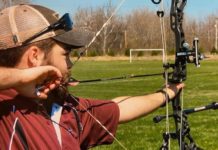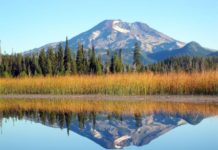Claramount fears that a sustained decline in the trout population could have similarly far-reaching impacts in the Au Sable. “It could literally be an off-ramp that could result in a state of the stream community that’s different, and hard to revert back,” he said.
The decline of river ecosystems is intensifying young anglers’ anxieties about the health of the planet. At just 14 years old, fisherman Landen Finkle worries about the condition of the river near his home in Traverse City. He’s particularly concerned about the loss of biodiversity.
“I grew up hearing stories about how great fishing was just five years ago. It’s sad, knowing that I’ll most likely never be able to experience the amazing fish that these waters used to have…that these rivers will never be what they used to be,” Finkle said.
Like a majority of his generation, climate and environment issues weigh on his mental health. Finkle is fascinated with freshwater ecology and hopes to guide fishing expeditions one day. But increasing signs of the river’s decline make him feel helpless at times, and fearful for the future of the pastime.
“River fishing is a really calming thing. And just to know that that could be coming to an end here is kinda sad,” he said. “It creates a lot of anxiety. There are a lot of things we can do to help, but there’s not really enough resources to help.”
Across the country, these anxieties are gradually translating into political momentum. Among recreational fishermen, a demographic that leans politically conservative, the issue has begun changing minds about climate change. Todd Tanner, a writer and lifelong sportsman, is the president of the climate education nonprofit Conservation Hawks, run by and for hunters and anglers. Tanner founded the group after an editor at an outdoors magazine rejected a story he had written about climate change, calling the issue a “Communist plot.”
The industry and its media have come a long way since then, he says. There are still hunters and anglers who deny the scientific consensus that climate change is caused by human behavior. But for many others, seeing the effects firsthand has changed their opinions on the issue. “It’s just becoming so obvious that they don’t really have a choice — they just have to accept it,” Tanner said.
Over the past decade, popular member organizations like Trout Unlimited have started explicitly incorporating climate change into their advocacy and messaging. “The big question in my mind isn’t whether sportsmen or women will eventually understand what’s happening and engage with it; they will. The big question in my mind is whether that will happen in time to make a difference,” he said.
Credit: Source link






























